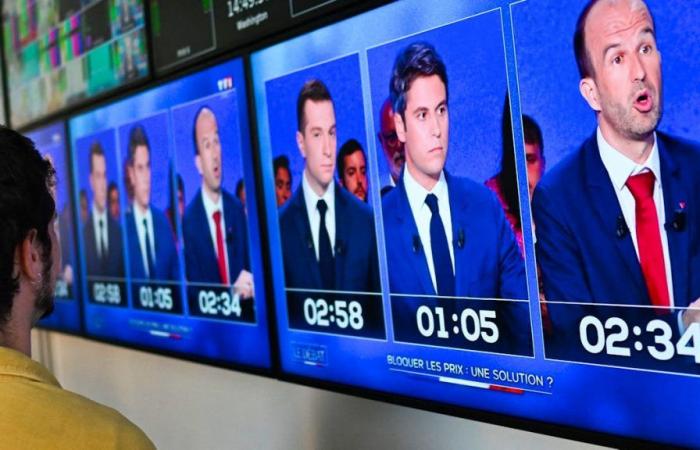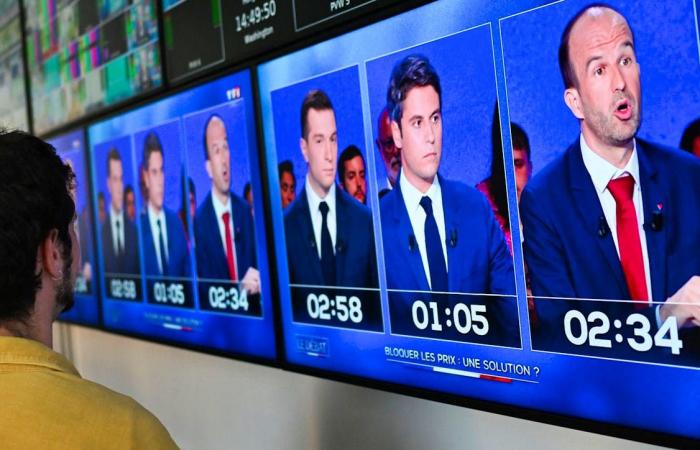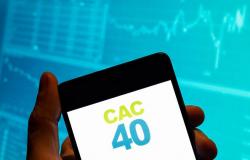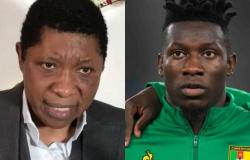Representatives of the main parties during the debate organized by the TF1 channel on June 25, 2024.
AFP
Four days before the first round of legislative elections in France, the candidates from the three main political blocs dramatized the issue and debated a hypothetical barrier against the far right, more favorite than ever. The National Rally (RN) and its allies are credited with 36% of voting intentions, ahead of the New Popular Front (NFP), a coalition of left-wing forces (28.5%) and the center-right alliance around the outgoing majority (21%) of President Emmanuel Macron.
The vote takes place on Sunday, with a second round on July 7. The mobilization promises to be strong, with 60 to 64% participation expected, more than in 2022 (47.8%) or the European elections on June 9 (51.49%) and complicates the forecasts. Already 250,000 French people living abroad have voted online in 24 hours, as many as in five days during the 2022 legislative elections.
Faced with the earthquake that would constitute the arrival of the far right to power in France, some 200 personalities called on the other parties to “clearly display now” a withdrawal agreement with a view to the second round. The presidential camp has so far favored a line “neither extreme right nor extreme left” before Emmanuel Macron decides. The head of the Ecologists Marine Tondelier (NFP) offered them a meeting with the Macronists to try to convince them to accept a “republican withdrawal”.
The question of the RN is also worrying the Jewish community in France. “We don’t vote for the extreme right, that’s it!” said Auschwitz survivor Denise Toros-Marter, expressing her “incomprehension” in the face of the position of Nazi hunter Serge Klarsfeld, who in the event of a duel between an RN candidate or the radical left La France Insoumise, said he would vote without “hesitation” for the RN. “I am perplexed”, “he is falling into the trap”, she judged.
For his part, the leader of France Insoumise asked his voters on Wednesday evening not to vote RN in the second round where left-wing candidates will no longer be present. “We will tell them that no one has to do this stupidity, whatever their motive,” declared Jean-Luc Mélenchon, who himself acts as a foil, including on the left. “Today throughout the left, it was agreed that he (Jean-Luc Mélenchon) could no longer be the one who should lead,” declared former socialist president François Hollande, NFP candidate.
Right-wing leader Éric Ciotti (LR, right), who has allied himself with the RN, intends to win back right-wing deputies in the second round if his bloc does not obtain an absolute majority. “I do not imagine that some of my friends would join a coalition which would include communists, socialists and the friends of Mrs Sandrine Rousseau”, affirmed the one whom the LR leadership has been trying to exclude from the presidency of the party since its alliance with the RN.
The day after a televised debate followed by around 5 million spectators, the climate of this lightning campaign became even more tense on Wednesday. The historic leader of the RN, Marine Le Pen, accused the left of wanting to contest its announced victory “in the street”: “The extreme left has always acted through violence,” she said.
During the televised debate, Jordan Bardella, 28, expected to be Prime Minister in the event of a RN victory, stood out for his confidence in his camp’s victory. He was up against Prime Minister Gabriel Attal, 35, and Manuel Bompard, 38, representing the left-wing alliance Manuel Bompard. Each dramatized the stakes. “In a few days, you will be called to the polls for a historic choice,” declared the leader of the RN.
The representative of the left Manuel Bompard called for “preventing fear from becoming a reality and ensuring that France does not descend into racism, hatred, every man for himself”. “France has a meeting with its values and its destiny, I have confidence in you and I have confidence in us,” said Gabriel Attal.
Thierry Beaudet, the president of the Economic, Social and Environmental Council, the third chamber of the Republic with the National Assembly and the Senate, estimated that the surprise dissolution decided by Emmanuel Macron on the evening of the European elections had plunged the country “into a political crisis and unprecedented democracy. In “three weeks, no political group can listen to the suffering and aspirations of citizens, deduce a solid project, confront it with those of its rivals, pour it into the public debate, compose a list of 577 serious and prepared candidates”, he lamented.
Abroad, the vote is also raising concerns. “After the elections we will see how our relations develop,” said German government spokesman Steffen Hebestreit. While qualifying France as “the most important and closest partner in Europe” for Germany.
(AFP)







